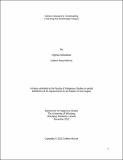| dc.contributor.author | McIvor, Colleen Sheryl | |
| dc.date.accessioned | 2014-09-25T18:15:31Z | |
| dc.date.available | 2014-09-25T18:15:31Z | |
| dc.date.issued | 2014-09-25 | |
| dc.identifier.citation | McIvor, Colleen Sheryl. Gikinoo'amaagowin Anishinaabeg (Teaching the Anishinaabe People); A thesis submitted to the Faculty of Indigenous Studies in partial fulfillment of the requirements for the Master of Arts Degree, Department of Indigenous Studies, The University of Winnipeg. Winnipeg, November 2013. | |
| dc.identifier.uri | http://hdl.handle.net/10680/744 | |
| dc.description.abstract | This thesis analyzes the roles and responsibilities of Anishinaabe Ogichidaakwe (woman warrior) using Anishinaabe and Western methodologies. As an Anishinaabekwe I use Anishinaabe language to engage in my responsibility to learn and share the language. In this thesis I move in and out of two different ways of knowing adapting to two epistemologies. While moving between Anishinaabe and Western epistemologies I located an ethical space where my spiritually connected and culturally grounded perspective is recognized. I examine and reconstruct the political/leadership, social, and spiritual roles and responsibilities of Ogichidaakwe over a critical period of change, 1632 to 1871. Anishinaabe leadership knowledge and practice experienced a shift as the Anishinaabeg community adapted to the experience of European contact. This shift is recognized after braiding together literature that is outlined in my thesis as the shift, colonial impact and absence. Of particular interest are women-based Aadizookaanag (Anishinaabe narrative with a scared being or spirit in it) and women-based Aadizookaanan (Anishinaabe narratives and ancient stories), and how these narratives are connected to Ogichidaakweg roles and responsibilities. I interconnect the Jiisikaan (shake tent), ethnohistorical, and historical as methodological approaches in my research in search of Debwewin (truth). Therefore, both the content and methodology of this thesis adds to the body of knowledge to the field of Indigenous Studies. | en_US |
| dc.description.sponsorship | Long Plain First Nation Post Secondary Program and the Long Plain Employment and Training Program and INDSPIRE | en_US |
| dc.language.iso | en | en_US |
| dc.publisher | University of Winnipeg | |
| dc.rights | info:eu-repo/semantics/openAccess | |
| dc.subject | Anishinaabe, methodology, Anishinaabe-izhichigewin, Ethical Space, Women’s Roles, Ogichidaakwe, Jiisikaan, Shake Tent, Ojibway, Anishinaabemowin, Anishinaabe language, Indigenous. | en_US |
| dc.subject | Indians of North America -- Social life and customs. | en_US |
| dc.subject | Indians of North America -- Colonization -- History. | en_US |
| dc.subject | North America -- History -- Colonial period, ca. 1660-1775. | en_US |
| dc.subject | Indians of North America -- Colonization. | en_US |
| dc.title | Gikinoo'amaagowin Anishinaabeg | en_US |
| dc.title.alternative | Teaching the Anishinaabe People | en_US |
| dc.type | Thesis | en_US |
| dc.description.degree | Master of Arts in Indigenous Studies | |
| dc.publisher.grantor | University of Winnipeg | |
| thesis.degree.discipline | Indigenous Studies | |
| thesis.degree.level | masters | |
| thesis.degree.name | Master of Arts in Indigenous Studies | |
| thesis.degree.grantor | University of Winnipeg | |

